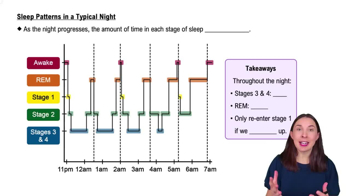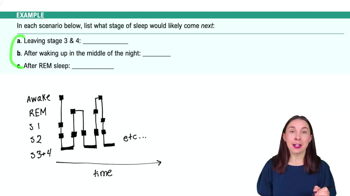Table of contents
- 1. Introduction to Psychology1h 43m
- 2. Psychology Research2h 20m
- 3. Biological Psychology2h 41m
- 4. Sensation and Perception28m
- 5. Consciousness and Sleep32m
- 6. Learning41m
- 7. Memory34m
- 8. Cognition37m
- 9. Emotion and Motivation35m
- 10. Developmental Psychology33m
- 11. Personality48m
- 12. Social Psychology41m
- 13. Stress and Health41m
- 14. Psychological Disorders44m
- 15. Treatment47m
5. Consciousness and Sleep
Sleep
Struggling with Psychology?
Join thousands of students who trust us to help them ace their exams!Watch the first videoMultiple Choice
In the _____ theory, dreams are less realistic because they come not from the outside world of reality but from within a person's memories and experiences.
A
adaptive
B
activation-synthesis hypothesis
C
restorative
D
latent content
 Verified step by step guidance
Verified step by step guidance1
Begin by understanding the context of the question, which is about theories related to dreams in psychology.
Identify the key terms in the question: 'dreams', 'less realistic', 'memories', and 'experiences'. These terms suggest a focus on the internal processes of the mind.
Consider the options provided: 'adaptive', 'activation-synthesis hypothesis', 'restorative', and 'latent content'. Each of these terms relates to different psychological theories or concepts.
Recall that the 'activation-synthesis hypothesis' is a theory that suggests dreams are created by the brain synthesizing and interpreting internal signals, which aligns with the idea of dreams coming from within a person's memories and experiences.
Conclude that the 'activation-synthesis hypothesis' is the most appropriate theory for the given description, as it explains dreams as a product of internal brain activity rather than external reality.

 3:25m
3:25mWatch next
Master Circadian Rhythms with a bite sized video explanation from Hannah Gordils
Start learningRelated Videos
Related Practice


































































































![Race, Genes and IQ Differences | Bret Weinstein [Mini Clip]](https://img.youtube.com/vi/IztL_m3pd70/mqdefault.jpg)



































































































